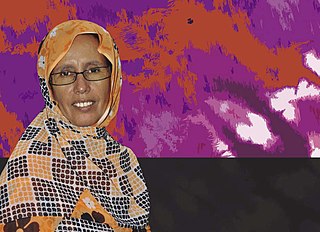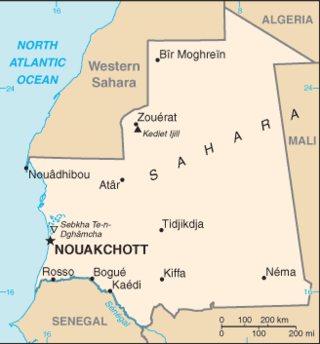Related Research Articles

Mu'awiya Ould Sid'Ahmed al-Taya is a Mauritanian military officer and politician who served as the fifth president of Mauritania from 1984 to 2005. He also served as the fifth prime minister of Mauritania from 1981 to 1992 except for a brief period in 1984.
The music of Mauritania comes predominantly from the country's largest ethnic group: the Moors. In Moorish society musicians occupy the lowest caste, iggawin. Musicians from this caste used song to praise successful warriors as well as their patrons. Iggawin also had the traditional role of messengers, spreading news between villages. In modern Mauritania, professional musicians are paid by anybody to perform; affluent patrons sometimes record the entertainment, rather than the musicians themselves, and are then considered to own the recording.

Mauritania competed at the 2004 Summer Olympics in Athens, Greece, from 13 to 29 August 2004. The country's participation at Athens marked its sixth appearance in the Summer Olympics since its debut in the 1984 Summer Olympics. The delegation included two track and field athletes, Youba Hmeida and Aminata Kamissoko, who were both selected by wildcards after both failed to meet either the "A" or "B" qualifying standards. Hmeida was selected as the flag bearer for the opening ceremony. Neither of the Mauritanians progressed beyond the heats.

Mauritania sent a delegation to compete at the 2000 Summer Olympics in Sydney, Australia from 15 September to 1 October 2000. This was the African nation's fifth time competing at the Summer Olympic Games. The Mauritanian delegation consisted of two track and field athletes, Sidi Mohamed Ould Bidjel and Fatou Dieng. Neither advanced beyond the first round of their respective events.

Slavery has been called "deeply rooted" in the structure of the northwest African country of Mauritania and estimated to be "closely tied" to the ethnic composition of the country, although it has also been estimated that "Widespread slavery was traditional among ethnic groups of the largely nonpastoralist south, where it had no racial origins or overtones; masters and slaves alike were black", despite the cessation of slavery across other African countries and an official ban on the practice since 1905.

Mauritania competed at the 2008 Summer Olympics which was held in Beijing, China. The country's participation at Beijing marked its seventh appearance in the Summer Olympics since its debut in the 1984 Summer Olympics. The delegation included two track and field athletes, Souleymane Ould Chebal and Bounkou Camara, who were both selected by wildcards after both failed to meet either the "A" or "B" qualifying standards. Chebal was selected as the flag bearer for the opening ceremony. Neither of the Mauritanians progressed beyond the heats.

Mauritania, formally the Islamic Republic of Mauritania, is a sovereign country in Northwest Africa. It is bordered by the Atlantic Ocean to the west, Western Sahara to the north and northwest, Algeria to the northeast, Mali to the east and southeast, and Senegal to the southwest. By land area Mauritania is the 11th-largest country in Africa and 28th-largest in the world; 90% of its territory is in the Sahara. Most of its population of some 4.3 million lives in the temperate south of the country, with roughly a third concentrated in the capital and largest city, Nouakchott, on the Atlantic coast.
The mass media in Mauritania is undergoing a shift into a freer journalistic environment, while becoming increasingly open to private sector.

Mauritania competed at the 2012 Summer Olympics in London, which was held from 27 July to 12 August 2012. The country's participation at London marked its eighth appearance in the Summer Olympics since its debut in the 1984 Summer Olympics. The delegation included two track and field athletes, Jidou El Moctar and Aicha Fall, who were selected to the team by wildcard places, as the nation had no athletes that met either the "A" or "B" qualifying standards. Moctar was selected as flag bearer for the opening ceremony while a LOCOG Games Maker carried it for the closing ceremony. Neither of the two athletes progressed beyond the heats.

Malouma Mint El Meidah, also simply Maalouma or Malouma, is a Mauritanian singer, songwriter and politician. Raised in the south-west of the country by parents versed in traditional Mauritanian music, she first performed when she was twelve, soon featuring in solo concerts. Her first song "Habibi Habeytou" harshly criticized the way in which women were treated by their husbands. Though an immediate success, it caused an outcry from the traditional ruling classes. After being forced into marriage while still a teenager, Malouma had to give up singing until 1986. She developed her own style combining traditional music with blues, jazz, and electro. Appearing on television with songs addressing highly controversial topics such as conjugal life, poverty and inequality, she was censored in Mauritania in the early 1990s but began to perform abroad by the end of the decade. After the ban was finally lifted, she relaunched her singing and recording career, gaining popularity, particularly among the younger generation. Her fourth album, Knou (2014), includes lyrics expressing her views on human rights and women's place in society.

Fatimata M'baye is a Mauritanian lawyer. She has campaigned for human rights in her country. In 2016, she was given an International Women of Courage Award by the U.S. Secretary of State.
Aïssata Touré Kane was a Mauritanian politician who was the country's first female government minister. After holding leadership positions in the youth wing and women's section of the Mauritanian People's Party, she served in the cabinet of President Moktar Ould Daddah from 1975 to 1978. Her time as a Minister ended when Daddah's Government was overthrown by a military coup.
Khadijatou Bint Ahmed, sometimes known as Khadija Mint Ahmed Aïche, is a Mauritanian politician, who in 1987, as Minister of Mines and Industry, became the country's first woman Cabinet Minister.
Lalla Mariam Bint Moulaye Idriss is a Mauritanian politician. Born in Ayoun el Atrous, she began her studies in that town before continuing them in Nouakchott, eventually gaining a doctoral degree in financial engineering.

L'Malouma Saïd is a Mauritanian anti-slavery activist, deputy to the Mauritanian National Assembly.

Aminetou Mint El-Moctar is a Mauritanian politician and women's rights activist. She was shortlisted for the Nobel Peace Prize in 2015 and is the first Mauritanian woman to be considered for the award.

The 2003 Mauritanian coup attempt was an attempted military coup in Mauritania which took place on 8–9 June 2003.
Ndioro Ndiaye is a Senegalese doctor and politician. From 1999 to 2009 she was Deputy Director-General of the International Organization for Migration (IOM).
Naha Mint Mohamed Lemine Ould Seyyidi was a Mauritanian journalist. She was considered the first woman to work in media in Mauritania.

Mauritania competed at the 2020 Summer Olympics in Tokyo which were held from 23 July to 8 August 2021. Originally scheduled to take place from 24 July to 9 August 2020, the Games were postponed due to the COVID-19 pandemic. It was the nation's tenth appearance at the Summer Olympics since its debut in 1984. The delegation consisted of two athletes, one man and one woman, competing in two athletic events. Sprinters Abidine Abidine and Houlèye Ba represented Mauritania in the men's 5000 metres and women's 800 metres event, respectively. For the first time, in an effort to promote gender equality, two flagbearers, one male and one female were allowed at the Olympics. Abidine and Houlèye lead the Mauritanian squad as the flagbearers in the opening ceremony. As of 2023, Mauritania, however, has yet to win its first ever Olympic medal.
References
- ↑ Mauritania Guide 2 Women Leaders